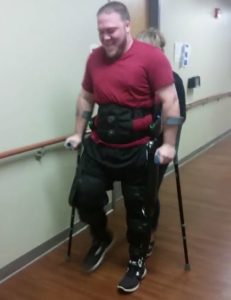Stem Cell Spinal Cord Injury Exoskeleton & Virtual Reality Study (SciExVR)

http://www.dropbox.com/s/8w4l8iav9u4efjc/20171013_091337.mp4?dl=0
SciExVR is a groundbreaking treatment designed to assist patients with spinal cord injuries. It combines stem cell therapy, exoskeleton rehabilitation, and virtual reality (VR) to help restore limb function both physically and mentally.
Eligible Patients
SciExVR is intended for individuals with thoracic, lumbar, or sacral spinal cord injuries resulting in paraplegia, sensory dysfunction, or autonomic issues (e.g., bowel, bladder, sexual). Cervical injuries and quadriplegia/tetraplegia are currently not eligible.
Treatment Process
The treatment involves an injection of bone marrow-derived stem cells at the injury site, delivered under radiologic guidance by a board-certified spinal surgeon. This is followed by intravenous and intranasal stem cell therapy to address the brain and upper motor neurons.
Early Results
The initial patient showed improvements within one month, including sensory level recovery and increased sphincter tone. By two months, the patient experienced sensory sensations and proprioception in their knee and quadriceps. At nearly three months, mobility and stamina improved, requiring less assistance during exoskeleton use.
Procedure Details
The procedure is performed on an outpatient basis at ParkCreek Surgery Center under general or MAC anesthesia, administered by certified anesthesiologists. The bone marrow aspiration is performed painlessly by a board-certified orthopedic surgeon.
Treatment Stay and Cost Details
A 3-night stay is required for the treatment, including a pre-op day, procedure day, and postop visit. Patients are free to return home the day after the procedure, and flying is completely safe. The total cost for the treatment is USD $19,600.00. Check www.clinicaltrials.gov NCT 03225626.
Hidden Sensory Pathways
Nearly 50% of patients with thoracic spinal cord injuries show sensory signals in the brain on fMRI—even without conscious perception. SciExVR may help activate or enhance these dormant neural pathways.